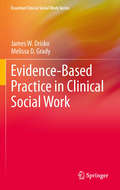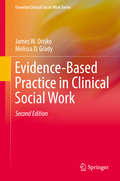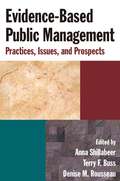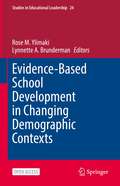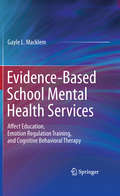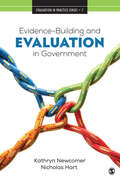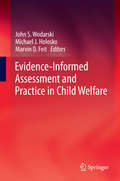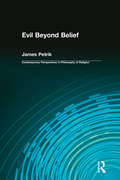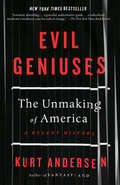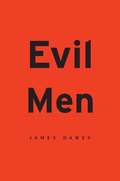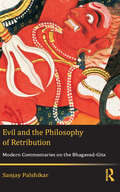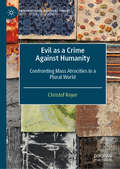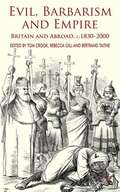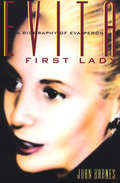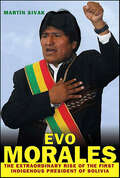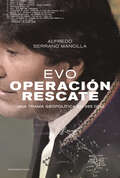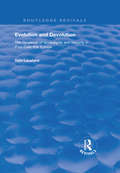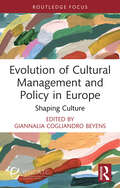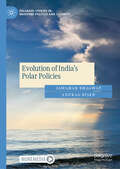- Table View
- List View
Evidence-Based Practice in Clinical Social Work
by James W. Drisko Melissa D GradyEvidence-Based Practice in Clinical Social Work introduces the key ideas of evidence-based clinical social work practice and their thoughtful application. It intends to inform practitioners and to address the challenges and needs faced in real world practice. This book lays out the many strengths of the EBP model, but also offers perspectives on its limitations and challenges. An appreciative but critical perspective is offered throughout. Practical issues (agency supports, access to research resources, help in appraising research) are addressed - and some practical solutions offered. Ethical issues in assessment/diagnosis, working with diverse families to make treatment decisions, and delivering complex treatments requiring specific skill sets are also included.
Evidence-Based Practice in Clinical Social Work (Essential Clinical Social Work Series)
by James W. Drisko Melissa D. GradyThe second edition of Evidence-Based Practice in Clinical Social Work continues to bridge the gap between social work research and clinical practice, presenting EBP as both an effective approach to social work and a broader social movement. Building on the models and insights outlined in the first edition, this new edition provides updated research and additional case studies addressing relevant issues such as trauma treatment and opioid dependence.Drawing on their multidisciplinary experience as practitioners, researchers, and educators, the authors guide readers through the steps of the EBP decision-making process in assessment, treatment planning, and evaluation. The book places special emphasis on balancing clinical expertise, research results, and client needs, and analyzes both the strengths and limitations of the EBP model in order to give readers a more complete idea of how the method will shape their own practice.In addition, this practice-building reference:Introduces core principles of EBP and details its processes in social workFeatures guidelines for engaging clients in EBP and transmitting research findingsOffers a range of case examples demonstrating EBP with diverse clientsAddresses education and supervision issues and related controversiesIncludes an expanded glossary and valuable resources for use in evidence-based practiceEvidence-Based Practice in Clinical Social Work is a practical resource for clinical social work professionals and educators that broadens the field and expands the healing possibilities for the profession.
Evidence-Based Public Management: Practices, Issues and Prospects
by Denise M. Rousseau Terry F. Buss Anna ShillabeerEvidence-based management (EBMgt) derives principles of good management from scientific research, meta-analysis, literature reviews, and case studies, and then translates them into practice. This book is the first systematic assessment of EBMgt and its potential application in public management.
Evidence-Based School Development in Changing Demographic Contexts (Studies in Educational Leadership #24)
by Rose M. Ylimaki Lynnette A. BrundermanThis Open Access book features a school development model (Arizona Initiative for Leadership Development and Research – AZiLDR) that offers a roadmap for schools to navigate the complexities of continuous school development. Filled with processes that balance evidence-based values with democratic, culturally responsive values, this book offers strategies to mediate the tensions and to address school culture, context and values, leadership capacity, using data as a source of reflection, curricular and pedagogical activity, and strengths-based approaches to meeting the needs of culturally diverse students. You will find: · - Active, reflective activities · - Case studies illustrating each concept · - The research base supporting each concept · - Descriptions of processes from other contexts (South Carolina, Germany, Australia, Sweden) · - Thoughts about next steps for contextually sensitive and multi-level school development · - Suggestions for cross-national dialogue and research within the Zone of Uncertainty Use this ideal source to guide school leadership teams in creating productive schools that continually grow!
Evidence-Based School Mental Health Services
by Gayle L. MacklemThis book offers a best-practices approach to providing effective mental health services at school. It draws on a widely used three-tiered public health model to create a system that addresses the emotional and behavioral needs of students most at risk.
Evidence-Building and Evaluation in Government (Evaluation in Practice Series)
by Kathryn Newcomer Nicholas HartPublic managers, contractors, and grantees conducting evaluations for government operate in complex environment where policymakers and commissioners of evaluation expect different types of “evidence” and simultaneously employ different criteria in judging the quality of that evidence. This text provides a road map for evaluators doing business within or for government, and public managers who are expected to assess and use evidence generated by a large variety of evaluation approaches. The book provides checklists and how-to guidance to help students and other readers develop skills in important activities such as: assessing the quality of evidence claims; developing theories of change to guide the design and evaluation of programs and policies; developing learning agendas to bridge the gap between evidence producers and potential evidence users; and increasing the support of public leaders and executives in the generation and use of evidence to inform their decision-making. The authors include end-of-chapter exercises for readers to test their ability to apply the skills described.
Evidence-Building and Evaluation in Government (Evaluation in Practice Series)
by Kathryn Newcomer Nicholas HartPublic managers, contractors, and grantees conducting evaluations for government operate in complex environment where policymakers and commissioners of evaluation expect different types of “evidence” and simultaneously employ different criteria in judging the quality of that evidence. This text provides a road map for evaluators doing business within or for government, and public managers who are expected to assess and use evidence generated by a large variety of evaluation approaches. The book provides checklists and how-to guidance to help students and other readers develop skills in important activities such as: assessing the quality of evidence claims; developing theories of change to guide the design and evaluation of programs and policies; developing learning agendas to bridge the gap between evidence producers and potential evidence users; and increasing the support of public leaders and executives in the generation and use of evidence to inform their decision-making. The authors include end-of-chapter exercises for readers to test their ability to apply the skills described.
Evidence-Informed Assessment and Practice in Child Welfare
by Michael J. Holosko John S. Wodarski Marvin D. FeitThis practice-oriented text presents evidence-based assessment methods and interventions that have been extensively field-tested in child welfare settings. The contributors offer empirical and field insights, comprehensive treatment models, and curricula in key areas such as child maltreatment, substance abuse, parent training, social skills, and youth employment interventions. For the professional reader, the book offers real-world guidance on social work practice, from hiring opportunities within a system to promoting lasting change as families and their issues grow increasingly complex. These chapters also take significant steps toward future improvements in child protection systems as the field evolves toward being more coordinated, effective, and professional. Included in the coverage: Legal requisites for social work practice in child abuse and neglect. The integrated model for human service delivery in child welfare. Risk assessment: issues and implementation in child protective services. Substance use and abuse: screening tools and assessment instruments. The process of intervention with multi-problem families. Preventative services for children and adolescents. Its multi-level approach makes Evidence-Informed Assessment and Practice in Child Welfare an essential professional development text for social workers, particularly those new to the job, as well as a progressive blueprint for social work administrators.
Evidenz- und Forschungsorientierung in Lehrer*innenbildung, Schule, Bildungspolitik und -administration: Neue Befunde zu alten Problemen (Educational Governance #55)
by Denise Demski Jan-Hendrik Hinzke Kris-Stephen Besa Johanna GesangMit Blick auf eine Evidenz- bzw. Forschungsorientierung vereint der Sammelband Überblicksbeiträge, empirische Studien sowie Beispiele guter Praxis auf den Ebenen Lehrer*innenbildung, Schulpraxis sowie Bildungspolitik und Bildungsadministration. Dabei werden nicht nur die jeweiligen Programmatiken hinter den Ansprüchen einer universitären Forschungsorientierung, eines datengestützten schulischen Handelns sowie einer evidenzbasierten Steuerung des Bildungssystems kritisch beleuchtet, sondern auch mögliche Ursachen einer geringen Evidenzorientierung auf den drei Ebenen identifiziert.Kapitel 10 ist unter einer Creative Commons Attribution 4.0 International License über link.springer.com frei verfügbar (Open Access).
Evil Beyond Belief
by James PetrikAn introduction to and overview of the entire problem of evil, from a philosophical perspective. The text aims to be introductory and inclusive, both by familiarizing students with the main contours of the intellectual terrain, and by pointing them in the direction of further resources.
Evil Deeds in High Places: Christian America's Moral Struggle with Watergate
by David E SettjeHighlights Watergate as a critical turning point in Christian engagement in US politicsThe Watergate scandal was one of the most infamous events in American democratic history. Faith in the government plummeted, leaving the nation feeling betrayed and unsure who could be trusted anymore. In Evil Deeds in High Places, David E. Settje examines how Christian institutions reacted to this moral and ethical collapse, and the ways in which they chose to assert their moral authority.Settje argues that Watergate was a turning point for spurring Christian engagement with politics. While American Christians had certainly already been active in the public sphere, these events motivated a more urgent engagement in response, and served to pave the way for conservatives to push more fully into political power.Historians have carefully analyzed the judicial, media, congressional, and presidential actions surrounding Watergate, but there has been very little consideration of popular reactions of Americans across the political spectrum. Though this book does not aspire to offer a comprehensive picture of America’s citizenry, by examining the variety of Protestant Christian experiences—those more conservative, those more liberal, and those in between—and by incorporating analyses of both white and black Christian reactions, it captures a significant swath of the American population at the time, providing one of the only studies to examine how everyday Americans viewed the events of Watergate. Grasping the dynamics of Christian responses to Watergate enables us to comprehend more completely that volatile moment in US history, and provides important context to make sense of reactions to our more recent political turmoil.
Evil Geniuses: The Unmaking of America: A Recent History
by Kurt AndersenWhen did America give up on fairness? The New York Times bestselling author of Fantasyland tells the epic history of how America decided that big business gets whatever it wants, only the rich get richer, and nothing should ever change—and charts a way back to the future. <P><P>During the twentieth century, America managed to make its economic and social systems both more and more fair and more and more prosperous. A huge, secure, and contented middle class emerged. All boats rose together. But then the New Deal gave way to the Raw Deal. Beginning in the early 1970s, by means of a long war conceived of and executed by a confederacy of big business CEOs, the superrich, and right-wing zealots, the rules and norms that made the American middle class possible were undermined and dismantled. The clock was turned back on a century of economic progress, making greed good, workers powerless, and the market all-powerful while weaponizing nostalgia, lifting up an oligarchy that served only its own interests, and leaving the huge majority of Americans with dwindling economic prospects and hope. <P><P>Why and how did America take such a wrong turn? <P><P> In this deeply researched and brilliantly woven cultural, economic, and political chronicle, Kurt Andersen offers a fresh, provocative, and eye-opening history of America&’s undoing, naming names, showing receipts, and unsparingly assigning blame—to the radical right in economics and the law, the high priests of high finance, a complacent and complicit Establishment, and liberal “useful idiots,” among whom he includes himself. <P><P>Only a writer with Andersen’s crackling energy, deep insight, and ability to connect disparate dots and see complex systems with clarity could make such a book both intellectually formidable and vastly entertaining. And only a writer of Andersen&’s vision could reckon with our current high-stakes inflection point, and show the way out of this man-made disaster. <P><P><b>A New York Times Bestseller</b>
Evil Men
by James DawesA searching meditation on our all-too-human capacity for inhumanity, Evil Men confronts atrocity head-on-how it looks and feels, what motivates it, how it can be stopped. James Dawes’s unflinchingly honest account, drawing on firsthand interviews, is not just about the things Japanese war criminals did, but about what it means to befriend them.
Evil and the Philosophy of Retribution: Modern Commentaries on the Bhagavad-Gita (100 Cases)
by Sanjay PalshikarWhat is ‘evil’? What are the ways of overcoming this destructive and morally recalcitrant phenomenon? To what extent is the use of punitive violence tenable? Evil and the Philosophy of Retribution compares the responses of three modern Indian commentators on the Bhagavad-Gita — Aurobindo Ghose, Bal Gangadhar Tilak and Mahatma Gandhi. The book reveals that some of the central themes in the Bhagavad-Gita were transformed by these intellectuals into categories of modern socio-political thought by reclaiming them from pre-modern debates on ritual and renunciation. Based on canonical texts, this work presents a fascinating account of how the relationship between ‘good’, ‘evil’ and retribution is construed against the backdrop of militant nationalism and the development of modern Hinduism. Amid competing constructions of Indian tradition as well as contemporary concerns, it traces the emerging representations of modern Hindu self-consciousness under colonialism, and its very understanding of evil surrounding a textual ethos. Replete with Sanskrit, English, Marathi, and Gujarati sources, this will especially interest scholars of modern Indian history, philosophy, political science, history of religion, and those interested in the Bhagavad-Gita.
Evil as a Crime Against Humanity: Confronting Mass Atrocities in a Plural World (International Political Theory)
by Christof RoyerThis book seeks to reimagine why and how to confront mass atrocities in world politics. Drawing on Hannah Arendt’s conception of evil, it interprets and understands mass atrocities as ‘evil’ in an ‘Arendtian’ sense, that is, as crimes against human plurality and, thus, crimes against humanity itself. This understanding of mass atrocities paves the way for reframing responses to mass atrocities as attempts to confront evil. In doing so, the book focuses on military intervention under the banner of the Responsibility to Protect (R2P) and judicial intervention by the International Criminal Court (ICC) and reframes them as tools to protect human plurality from evil. Furthermore, the book looks at the place and the role of R2P and the ICC in the changing landscape of world order. It argues that the protection of humanity from evil can serve as a legitimate Grundnorm (basic norm) around which a global constitutional order in an inherently pluralistic world can be constructed.
Evil in the Modern World: International and Interdisciplinary Perspectives
by Laura Dryjanska Giorgio PacificiThis interesting volume focuses on a set of phenomena which increasingly alarm the political world and public opinion: from the more obvious ones like torture, disease, human trafficking, abuse, genocide, displacement, to more subtle forms found in sports, technology and law. It looks at how and why these phenomena are universally condemned, and could be considered to threaten the very foundations of modern democracy; yet continue to be tolerated. The volume therefore goes beyond what Hannah Arendt has called the "banality of evil" and discusses the presence of condemned and heinous practices in society as fluid and chaotic but as non-trivial; capable of great transmutations through various epochs. Practices and actions considered as "evil" manifest in situations where individuals or groups hold power or seize power, and the contributions in this volume explore the close relation between power and evil. The volume draws upon sociology, psychology, cultural studies, political science, as well as philosophy, theology, anthropology, and neurology of the individual and of the group to provide a comprehensive understanding of the multiple facets of evil in the contemporary world.
Evil, Barbarism and Empire
by Tom Crook Rebecca Gill Bertrand TaitheEvil and barbarism continue to be associated with the totalitarian 'extremes' of twentieth-century Europe. Addressing domestic and imperial conflicts in modern Britain and beyond, as well as varied forms of representation, this volume explores the inter-relations of evil, atrocity and civilizational prejudice within liberal cultures of governance.
Evita, First Lady: A Biography of Evita Peron
by John BarnesEva Peron was a star and a legend during her lifetime, one of the most alluring women of the twentieth century. Through the hit Broadway musical Evita by Andrew Lloyd Webber, her story became famous, and with the release of the film starring Madonna as Eva Peron, her life became a media obsession once again. Whore and feminist, tyrant and saint, Evita was the beautiful and legendary woman who rose up from poverty to become the hypnotically powerful first lady of Argentina. To millions of poor people she was a savior; to her enemies she was a monstrous dictator. In this riveting biography, John Barnes explores the astonishing paradox of this champion of the poor who attacked the rich and, in the process, made herself the wealthiest woman in the world.
Evo Morales: The Extraordinary Rise of the First Indigenous President of Bolivia
by Martín SivakThe fascinating Bolivian president Evo Morales is vying with the brash and provocative leader of Venezuela, Hugo Chavez, to be the most influential figure in South American politics today. Since coming into office four years ago, Morales has been intensely critical of the United States, speaking out against the drug war at the United Nations and implementing socialist programs at home, including the nationalization of British Petroleum holdings and other foreign investments. And he has reached out to America's political enemies, including Cuba and Iran.Based on personal interviews and unprecedented access, Sivak traces the rise of Morales from his humble origins in a family of migrant workers to his youth as union organizer and explosion onto the national stage.
Evo: Una trama geopolítica en 365 días
by Alfredo Serrano MancillaUna crónica que nos abre la puerta a la intimidad de los 365 días transcurridos desde la forzada renuncia de Evo Morales en noviembre de 2019 y su rescate clandestino hasta el regreso triunfante a su país en noviembre de 2020. Fotos, chats, y un pulso narrativo inquietante que obliga a seguir leyendo. Esta es la crónica del año más peligroso en la vida de Evo Morales, desde su forzada renuncia en noviembre de 2019 después de ganar una vez más las elecciones presidenciales hasta el regreso triunfante a su país en noviembre de 2020, una trama oculta de relaciones entre gobiernos, organismos internacionales, medios de comunicación y personas comunes. Narrado con formidable suspenso y minucioso detalle por quien fue actor y testigo de los hechos, documentado con materiales inéditos y con prólogo de Alberto Fernández y del propio Evo, el libro revela cómo se urdió el golpe de Estado en Bolivia; la actitud de Mauricio Macri ante el pedido de apoyo humanitario; el rol de los gobiernos de Paraguay, Perú y Ecuador y del Grupo de Puebla; el rescate clandestino del depuesto presidente; sus días como refugiado en la capital de México; su asilo en la Argentina en el barrio porteño de Colegiales y el conurbano bonaerense, y su regreso luego de la victoria del MAS en las elecciones generales. Pero, sobre todo, ofrece una aproximación al Evo que muy pocos conocen, sus tácticas políticas, su afición futbolera, el dirigente de la calle aislado por la pandemia y la campaña electoral desde el exilio. "Evo: Operación Rescate podría parecer un thriller de ficción -provoca el autor-. Sin embargo, todo lo que leerán es verdad".
Evolution and Devolution: The Dynamics of Sovereignty and Security in Post-Cold War Europe
by Tom LansfordThis title was first published in 2000: This study bridges the gap in the otherwise rich literature on European security through its analysis of past and present efforts at military integration. Previous works have concentrated on the transatlantic relationship or the intra-European dimension of the effort to create autonomous defense capabilities or even on the ramifications of the changed defense market. Evolution and Devolution combines these themes and subjects. The work integrates these topics against the backdrop of the current scholarly debate over international relations by examining the changing nature of sovereignty and the evolution of the nation state. In the end, the course toward more integration and yet continued participation of the U.S., is shown to be the optimum course for EU member states in light of the security threats and constraints facing national governments.
Evolution of Cultural Management and Policy in Europe: Shaping Culture (ENCATC Advances in Cultural Management and Policy)
by GiannaLia Cogliandro BeyensSince the 1990s, cultural management and policy in Europe have undergone transformative changes. This insightful book offers a comprehensive journey through that evolution, blending historical insights with an analysis of current trends to illuminate the future of the field.The book also highlights the pivotal role of cultural networks in shaping and advancing culture, creativity, and heritage, bridging academic inquiry with real-world practice. Through a focused case study on the European Network on Cultural Management and Policy, ENCATC, it provides a unique perspective on how networks shape policy and management strategies across Europe.A must-read for scholars, practitioners, policymakers, and students, this book delivers key insights into the ever-changing landscape of arts and cultural management.
Evolution of India's Polar Policies (Palgrave Studies in Maritime Politics and Security)
by Jawahar Bhagwat Anurag BisenThe book examines India’s involvement in the Polar regions, focusing on its historical evolution and current scientific and political efforts. It also offers suggestions for enhancing India’s Polar policies, which primarily revolve around climate change and scientific research. The book highlights that India's extensive coastline may be at risk due to the effects of global warming caused by the melting of the Arctic and other ice sheets. As a significant international player, India is well set up to have substantial influence on shaping the policies of Arctic nations to promote sustainable development projects, as well as play a crucial role in the sustainable development of the Arctic, particularly in light of the geopolitical changes resulting from the Ukraine conflict. This timely book also delves into key topics such as Arctic geopolitics, shipping, and energy security. This analysis will be valuable for policymakers, diplomats, political scientists, academics, and students with an interest in these areas.
Evolution of International Environmental Regimes
by Simone SchieleDrawing specifically on the international climate regime, Simone Schiele examines international environmental regimes from a legal perspective and analyses a core feature of international regimes – their ability to evolve over time. In particular, she develops a theoretical framework based on general international law which allows for a thorough examination of the understanding of international law and the options for law-creation in international environmental regimes. The analysis therefore provides both a coherent understanding of the international climate regime and a starting point for further research in other regimes.
Evolution of Japan's Party System
by Leonard J. SchoppaIn August 2009, the Democratic Party of Japan (DPJ) won a crushing victory over the Liberal Democratic Party (LDP), thus bringing to an end over fifty years of one-party dominance. Around the world, the victory of the DPJ was seen as a radical break with Japan's past. However, this dramatic political shift was not as sudden as it appeared, but rather the culmination of a series of changes first set in motion in the early 1990s.The Evolution of Japan's Party System analyses the transition by examining both party politics and public policy. Arguing that these political changes were evolutionary rather than revolutionary, the essays in this volume discuss how older parties such as the LDP and the Japan Socialist Party failed to adapt to the new policy environment of the 1990s. Taken as a whole, The Evolution of Japan's Party System provides a unique look at party politics in Japan, bringing them into a comparative conversation that usually focuses on Europe and North America.
